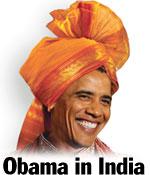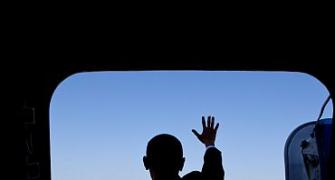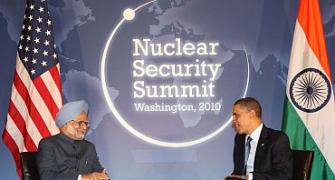 US President Barack Obama is unlikely to rake up the issue of Kashmir during his visit to India, a senior American official in New Delhi indicated. The US has reiterated that Kashmir is a bilateral issue to be resolved between New Delhi and Islamabad.
US President Barack Obama is unlikely to rake up the issue of Kashmir during his visit to India, a senior American official in New Delhi indicated. The US has reiterated that Kashmir is a bilateral issue to be resolved between New Delhi and Islamabad.
In terms of co-operation in the region, the officials said Afghanistan and Pakistan were on top of their agenda. "Both countries are working hard and making sacrifices in Afghanistan," the official said. Talking about India's role in Asia, the officer said, 'I think Obama administration is very supportive of the regional architecture. We are very supportive of a vocal India. The US will be joining East Asia summit next year."
Even on contentious issue of outsourcing, the American side gave signals that were conciliatory. "I think those of us who live in India, we know that co-operation results in benefits and jobs for both countries," said the officer. He added, 'President Obama will have lots of opportunities in Mumbai and in New Delhi to engage small and medium business on trade and investments issues that will bring jobs to US and to India."
Asked if the US supports a permanent membership in the UN for India, the officials parroted the existing official line. Whenever there are UN reforms, the US firmly believes that India has to have a "central role" to play, they said, but refused to elaborate on what this means.
However, on the balance, American sources had nothing substantial to say except that both sides are "looking for ways to work closely. We are building the person-to-person relationship to understand each other better." In fact, on many serious bilateral issues related to defence, outsourcing and strategic issues the officials gave the impression of " work in progress."
The American side tried their best to paint a positive story of Indo-US bilateral ties.
On China's intervention in Kashmir and its placing troops in Gilgit-Baltistan, the officials said that the US has always maintained that the Kashmir issue had to be settled between India and Pakistan. "It is worth noting that the US wants good ties with India and China. The US also wants India and China to have good a relationship,"the official said.
They emphasised that the relation in the post-nuclear deal era has diversified and deepened. "After the incredibly important landmark achievement of the nuclear agreement we are working in every field that's imaginable where US and India would work together to address the challenges of just not of India or US but of the globe," he said.
When asked about possibility of new level of defence ties a senior officer said, "We are not going to talk about if India can become a treaty partner in anyway, but we have already worked together in Tsunami relief and in some of the Indian Navy's exercises. India's naval presence is important in anti-piracy operations. We are talking to see how well we can co-ordinate and work closely with each other."
Overall, the officials said, the relationship between India and the US was no more that of a donor-donee.
On the security engagements between the two countries, officials said the US has more mature ties with India than any other country. "There have been over 50 joint military exercises between the two countries in the last eight years. This is more than what we have had with China, the UK, and Israel," an official said.
Despite reports that Indian Defense Minister A K Antony is in no great hurry to sign major defense agreements with the US, the officials said the defence ties between the two countries was very mature and well-established.
"Since 2000, the ties have been excellent. They are no more transactional and on a sale-basis. There are regular personnel-to-personnel interactions and exchange programmes where we learn from each other. Even the military sales have gone through, on time and on budget. So much so that India will get its P8-I maritime aircraft at the same time the US Navy is getting it. There is so much the two forces can learn from each other in the technicalities and other details," an official said.
Regarding the certain defence related agreements like CISMOA (Communications and Information Security Memorandum of Agreement) American officers said that Indians were conducting an internal consultation. America wants to sign the CISMOA with India before any high-tech deal is signed. The officers said these issues are not 'off the table.'
In terms of trade and business, the ties have grown rapidly, they said. US-India trade is currently at $50 billion and is expected to grow further. "And it is not an imbalanced partnership. In 2008, the deficit on India's side was only $ 9 billion. So, unlike with some other countries, the ties that US has with India is very much two-way. Structurally we are in very good shape. The underlying pressure there is in our ties with some other countries is not there in India's case," the official said.
Asked if the US wanted India to amend its nuclear liability bill and if not doing so will kill the civilian nuclear deal, the officials said there were a few steps before things get operational. "The first thing for India to do would be to normalise its nuclear architecture. We think it is the right thing to do before India joins the nuclear mainstream. And then it has to ensure that domestic and international suppliers get an opportunity to participate and to begin negotiations," an official said. He added, "Signing up to Convention on Supplementary Compensation is a very positive step, if and when it happens. That will then allow the companies to begin commercial negotiations required to fulfill the promise of the (nuclear) deal," said sources
Overall, the officials felt that with issues like outsourcing, visa issues, the nuclear liability bill, and military sales remaining to be sorted between the two countries, the bilateral ties are a complicated story.
"The key to the Obama visit is to succeed in telling this complicated story correctly," an official said.
With inputs from Krishnakumar P in Mumbai










